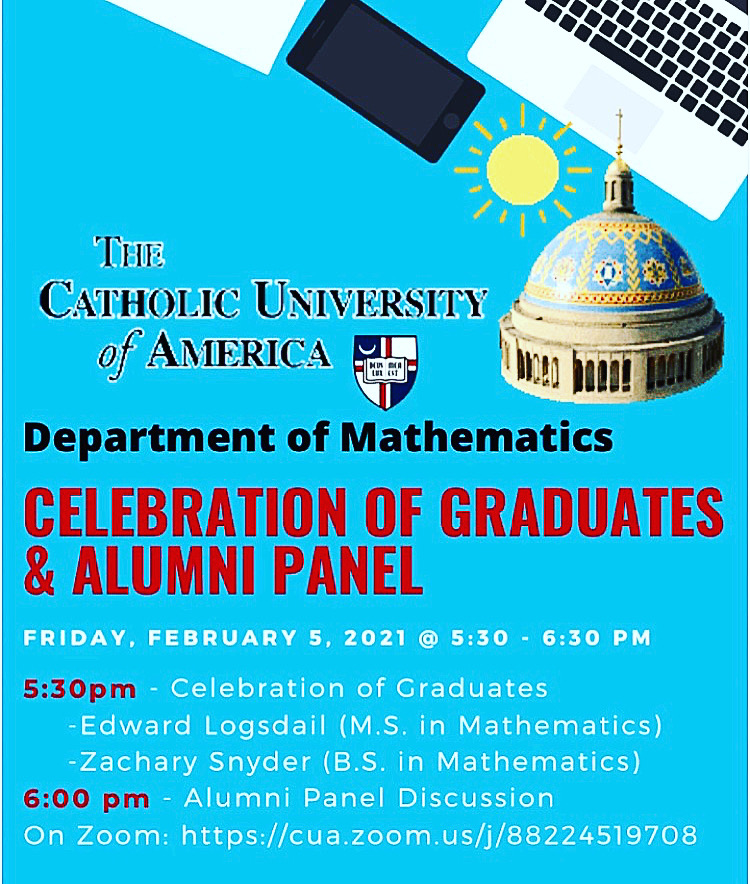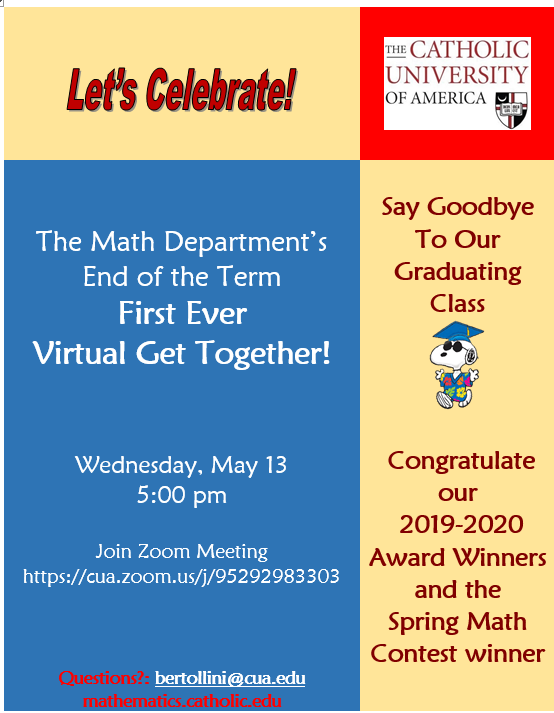2/5/2021 Alumni Panel
We appreciate all the alumni that came to this panel! See a short description of each alumnus/alumna under "Alumni and Giving."

11/6/2020
Undergraduates who did summer research with our math faculty gave presentations on Nov 6, 2020. Congratulations to the students and faculty!

6/15/20
5/14/2020
Congratulations to the 2020 Math Award Winners!
2020 Euphemia Lofton Haynes Award went to Christopher Le and Kerry Silidker
2020 Finan Award Recipient was Casandra Abgrab
5/13/20 Congratulations Graduates and Award Winners!
Join the department on Wednesday, May 13 at 5:00 for a Zoom celebration of our 2020 graduates. We'll also be announcing the winners of the Finan (Junior) and Haynes (Senior) Awards for academic achievement.

4/28/20 Online Precalculus Review Course Ready to Roll!
The mathematics department's self-paced summer precalculus online courses, Math 11 and Math 12, are set up and ready for students to begin on May 20. Returning students and incoming freshmen can register for the course through Cardinal Station. More information about the course is available here. The course is for:
1. Students who took the placement test and placed into Math 108/Math 110 but would rather start in calculus. If students take one of these courses and pass, they will be able to start calculus immediately. Students will be on track for their majors and will be able to take classes in the standard sequence, students will need to take one fewer class (by not having to take Math 108 or Math 110), and will need fewer summer classes to catch up. (This is a much cheaper alternative!)
2. Students who placed into Calculus I but would benefit from additional review of precalculus topics. (ie., student placed into Math 111/Math 121). Students will start calculus with better algebra and precalculus skills.
3. Students who have not had math in a long time, or learned math in another language. These students will refresh their math skills and become familiar with math terminology in English.
4/27/20
First 4+1 Master's Degree in Mathematics Defense
"A Non-Collision Criteria for a Generalized Camassa-Holm Equation" by Davis Michaud.
Davis Michaud became the first graduate mathematics student to defend his master's thesis for the accelerated 4+1 Master's Program in Mathematics. The program is designed to allowed for strong and motivated undergraduate students to complete a bachelor’s degree in mathematics and master’s of science degree in mathematics in a total of five years. Congratulations to Davis and to his advisor, Dr. Curtis Holliman.
4/21/20
Catholic University Research Day 2020
Research Day was online for the first time in its five year history. Three math majors had poster and oral presentations.
2) Optimizing waste collection routes in Howard County using Mathematical Modeling Tools by Elizabeth Pacious and Sarthak Regmi, School of Arts and Sciences (Mathematics)
3) The European Call Option by Gregory McCarthy, School of Arts and Sciences (Mathematics)
2/14/20
Guest Lecture: Dr. Bilal Khan
Happold Professor of Sociology
Departments of Sociology and Computer Science
University of Nebraska-Lincoln
"Advances in social network analysis for estimating the size of a social population from a small sample"
Estimating the size of a subpopulation is an important pre-requisite to devising effective public policy. At the
same time, size estimation is exceedingly difficult when the subpopulation of interest is “hard to reach”. The resolution of such difficulties is among the concerns of social network analysis. In this talk, Dr. Khan will present a recent result in social network analysis relating to the properties of random graphs. Informally stated, the question considered is:
Can one estimate the size of a social network from merely a snapshot of a small random part of it?
As it turns out, and perhaps somewhat surprisingly, the answer is yes for a large class of random graphs.
